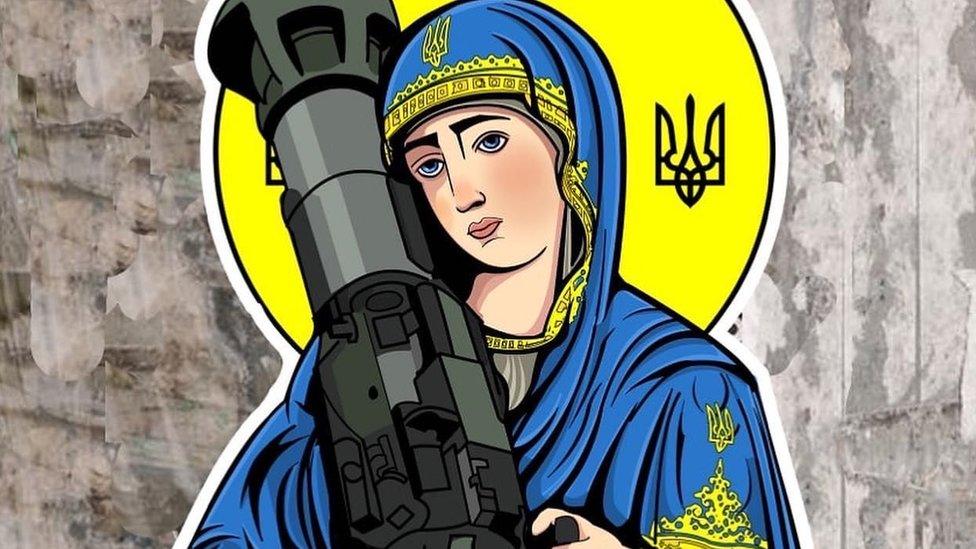How 'Saint Javelin' raised over $1m for Ukraine
- Published

A Canadian marketer who had planned to raise a humble few hundred dollars for a charity helping relief efforts in Ukraine has found himself the creator of a viral marketing campaign that has so far earned well over C$1m ($783,000; £600,000) using the unlikeliest of images - a rocket-armed saint.
Christian Borys helped develop the image - known as "Saint Javelin" - which depicts the Virgin Mary cradling a US-made FGM-148 anti-tank weapon. These missiles are among the arms being sent by Western allies to Ukrainian forces to aid in their fight.
The marketer and ex-journalist said the response to the campaign, which sells the image on everything from tote bags to sweatshirts, flags and stickers, has been "overwhelming", with thousands of orders coming in each day.
He now plans for the "Saint Javelin" campaign to become a full-time effort and hopes to hire permanent staff so it can continue to support reconstruction efforts for decades after the current conflict ends.
The Toronto-based Mr Borys, 35, is no stranger to Ukraine and its people, and is of Ukrainian heritage.
From 2014 to 2018, he freelanced for a variety of media outlets - including the BBC - from the country, where he says he was particularly moved by the plight of widows and orphans from the conflict in Donbas in eastern Ukraine, which began in 2014 when separatists, backed by Moscow, seized parts of the region.
A few years later, he was watching another conflict brewing.
"When I knew [the Russian invasion] was going to happen, I wanted to not sit idly by," Mr Borys said, speaking from his father's house in Poland near the Ukrainian border, where he is helping coordinate relief shipments for a local non-governmental organisation.
He does not take credit for the original concept behind Saint Javelin, which predates the current conflict. Mr Borys was inspired by the work of US artist Chris Shaw, who in 2012 painted a Madonna holding a gold-plated AK-47 - which was later, in online memes, replaced with a rocket launcher - when he commissioned a colleague to draw the image and began printing stickers.
His initial goal was to raise C$500 for the Help Us Help Charity, a long-standing, Canadian-based organisation operating in Ukraine that helps the families of killed soldiers, as well as veterans suffering from post-traumatic stress.
What began as a trickle of orders in the days before the invasion, he recalls, quickly became a torrent.
"The first day I had the site up, we got two orders. I thought that was outstanding. The next day we did C$1,000, so I printed up those stickers and put [the image] on Instagram," he added. "The day after that, it was C$5,000."
On 24 February, the day Russia invaded, Mr Borys received C$45,000 worth of orders, rising to C$170,000 in one 24-hour period two days later.
"It went completely viral," he said. "There are a whole lot of logistical problems that have come up because we never expected that. I hoped I could donate 500 bucks and now it's become its own crazy thing."
As of the evening of 10 March, Mr Borys has sold more than C$1.16m worth of Saint Javelin merchandise. Of the net profit, 100% goes to the Help Us Help Charity.
Part of Saint Javelin's success, Mr Borys believes, is a result of the outsized importance that anti-tank weapons such as the US-produced Javelin are playing in Ukraine's efforts to resist the Russian invasion.
The US and Nato allies have reportedly already shipped over 17,000 anti-tank missiles - including Javelins - to Ukraine.
CITY SURROUNDED: Efforts to reach Mariupol trapped
IN MAPS: Day 15 of Russia's advance
"[Javelins] are what Ukraine desperately wanted," Mr Borys said. "They knew that if Russia ever did what they just did, they would do so with a lot of tanks."
The missiles, he said, have allowed Ukrainian forces to fight the invasion, despite the large number of Russian tanks and other armoured vehicles, and contested skies.
Looking towards the future, he believes donations will be needed long after the guns fall silent and the war ends.
"What you're seeing now is just the first part. There's going to be decades of reconstruction, because of the scale of the destruction we're seeing," he said. "There will be mines across the country, and destroyed tanks, and that sort of stuff. Then there's all the displaced people and refugees."
If he can turn it into a sustainable business, Mr Borys said that he intends to make helping Ukraine "his life's work".
"I honestly don't know how we're going to do that. We're only three weeks into this but it's gotten so big and chaotic," he said. "It's bananas, and it's impossible to keep running it with a hodgepodge of volunteers."
Looking back at the last few weeks, Mr Borys admits that he's not really been fully be able to grasp the impact that his Saint Javelin effort might be having and remains surprised at how popular it has become.
"It's akin to a one-hit-wonder type of band, where [a song] goes crazy and you have no control over it," he said. "I think eventually I'll just look back and think this was the strangest experience of my life, and that I didn't comprehend what was happening."
Related topics
- Published10 March 2022
- Published10 March 2022
- Published10 March 2022
- Published10 March 2022